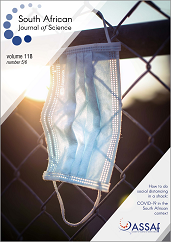The ethics behind mandatory COVID-19 vaccination post-Omicron: The South African context
DOI:
https://doi.org/10.17159/sajs.2022/13239Keywords:
ethics, mandatory, vaccines, COVID-19, South AfricaAbstract
The legitimacy of mandatory vaccine policies is underscored by a public health ethics framework based on the principles of limited autonomy, social justice and the common good. Ideally, vaccine uptake ought to occur on a voluntary basis as an act of solidarity to ensure that everyone is protected. Given that the altruistic approach has failed and vaccine uptake remains sub-optimal in South Africa, in this paper, I argue for vaccine mandates, in a post-Omicron context. This viewpoint is substantiated by several considerations. Healthcare workers are fatigued after 2 years of treating COVID-19 and many are still treating patients with post-viral syndromes, mental health conditions and cardiovascular complications. Health systems remain under pressure as people with non-COVID diseases, neglected during the pandemic, are also now presenting to medical practices and hospitals. Although South Africa has emerged from a relatively less severe fourth wave of COVID-19, there have been many deaths. Vaccine and natural immunity in a relatively young general population has been advantageous. However, the country has a high prevalence of HIV and those who are untreated may not be able to clear the coronavirus easily. Similarly chronic illnesses place many at risk for severe disease from COVID variants, especially if unvaccinated. The future is shrouded in uncertainty. The next variant could be similar to or less severe than Omicron, yet still impact negatively on health systems, education and the economy. Physical distancing is not ideal in many low socio-economic settings, making vaccines an important component of our prevention toolbox. Our safest option now is to ensure that as many South Africans as possible are vaccinated and receive boosters. Vaccine mandates work to achieve this end.
Significance:
The legitimacy of COVID-19 vaccine mandates post-Omicron is explored from an ethical perspective, given that the fifth wave remains unpredictable in South Africa – a country with a high prevalence of HIV, vulnerable unvaccinated adults and children, and fragile public health systems. The emergence of new variants is uncertain. However, vaccines are central to an appropriate response to protect public health, health systems and the economy.
Published
Issue
Section
License

All articles are published under a Creative Commons Attribution 4.0 International Licence
Copyright is retained by the authors. Readers are welcome to reproduce, share and adapt the content without permission provided the source is attributed.
Disclaimer: The publisher and editors accept no responsibility for statements made by the authors
How to Cite
- Abstract 1402
- PDF 1865
- EPUB 571
- XML 538













.png)